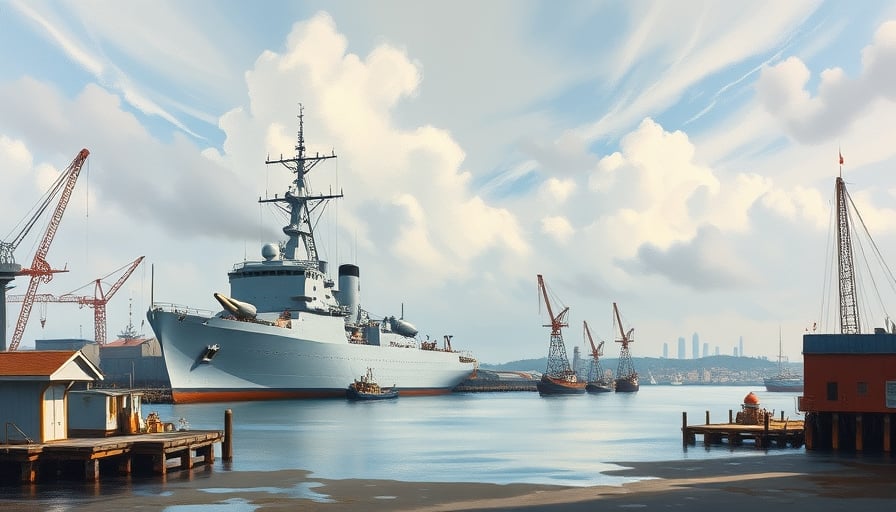Thyssenkrupp’s Marine‑Systems Spin‑Off Sets the Stage for a Robust German Market Opening
On Monday, 20 October 2025, the German industrial giant Thyssenkrupp AG completed the separation of its marine‑shipbuilding arm, Thyssenkrupp Marine Systems (TKMS), and placed the newly independent entity on the Frankfurt stock exchange. The first trading session saw TKMS shares surge from an initial price of €60 to nearly €73, a climb that underscored investors’ confidence in the company’s strategic positioning and the broader defence‑sector momentum sweeping Europe.
The Spin‑Off in Context
Thyssenkrupp’s decision to carve out TKMS reflects a long‑term strategy to sharpen its focus on high‑margin industrial activities while enabling the marine‑shipbuilder to operate with greater agility. The move follows a trend among European conglomerates that are separating defence and shipbuilding units to unlock value and attract specialist capital. In a market still buoyed by European defence spending increases and NATO‑led procurement programmes, TKMS is well placed to benefit from a steady stream of submarine and surface‑craft orders.
Market Reception and Immediate Impact
The debut of TKMS shares was met with a significant upside in the early trading session. After a modest opening at €60, the shares climbed to nearly €73, translating into a gain of roughly 22 %. This performance is particularly striking given that the German market opened with the DAX hovering above the 24 000‑point threshold, reflecting a positive sentiment across the index. The MDAX, meanwhile, registered a modest rise of 0.98 %, signalling a broadly favourable environment for medium‑cap companies.
TKMS’s share price momentum contributed to a broader rally in defence‑related equities. While the sector had experienced a pronounced downturn earlier in the week, the successful launch of TKMS helped re‑ignite investor interest in German armaments firms such as Rheinmetall, Renke, and Hensoldt, whose stocks were under pressure after a sharp decline on Friday.
Financial Snapshot of Thyssenkrupp AG
Although the spin‑off has transferred the bulk of marine‑shipbuilding assets to TKMS, Thyssenkrupp AG’s core business remains robust. As of 16 October 2025, the parent company’s share price stood at €12.06, a level well below the 52‑week high of €13.35 but comfortably above the low of €3.13. With a market capitalization of approximately €8.21 billion and a price‑earnings ratio of –6.16, Thyssenkrupp’s valuation reflects its status as a cyclical industrial producer, heavily influenced by macro‑economic conditions and commodity prices.
The company’s diversified product portfolio—ranging from flat‑rolled and cast steel products to elevators, escalators, machine tools, bearings, and industrial components—provides a buffer against sectoral swings. In addition, Thyssenkrupp’s real‑estate, factory construction, and design services contribute a steady revenue base that complements its manufacturing operations.
Outlook for TKMS and the German Defence Market
TKMS’s entry onto the exchange marks a pivotal moment for German defence manufacturing. With the European Union’s commitment to strengthening maritime security and the recent announcement of increased subsidies for naval procurement, the company is poised to secure new contracts for submarines and surface vessels. Its technological expertise, combined with an established workforce and supply chain, positions it as a key player in meeting NATO and EU defence requirements.
For Thyssenkrupp AG, the successful spin‑off is expected to streamline operations and potentially improve earnings per share as the parent company focuses on its core metal‑producing and industrial‑equipment businesses. The separation also allows Thyssenkrupp to pursue additional strategic initiatives—such as expanding its flat‑rolled steel offerings or deepening its presence in emerging markets—without the constraints that a diversified conglomerate structure might impose.
Conclusion
The debut of Thyssenkrupp Marine Systems on the Frankfurt exchange has not only delivered immediate shareholder value but also signalled a positive shift in investor sentiment toward Germany’s defence sector. As the market continues to process the implications of this move, Thyssenkrupp AG and its newly independent marine‑shipbuilder are likely to benefit from a favourable macro‑economic environment, heightened defence spending, and a renewed focus on strategic core competencies.
